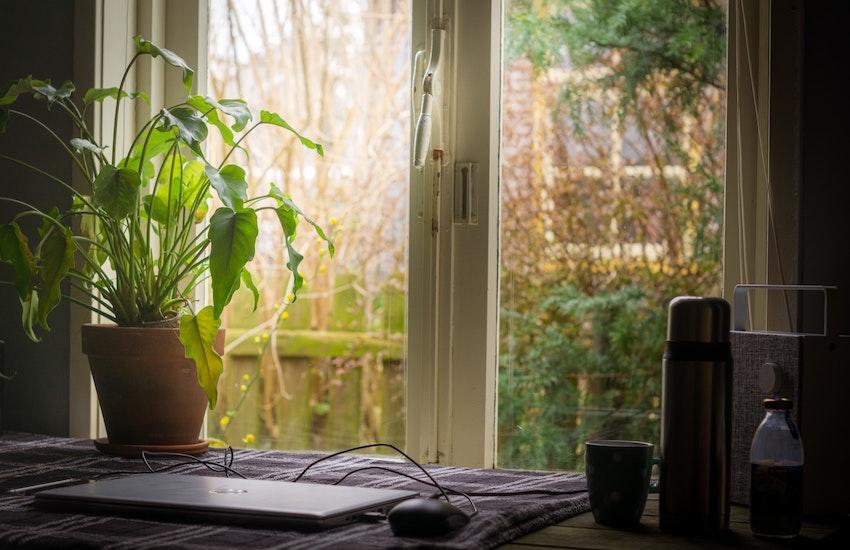4 Self-Care Tips for COVID-19 Quarantine
Published: Apr 17, 2020

Living in a global pandemic isn’t easy. As we wait for news updates and official guidance, we can experience a lot of stress. And this stress can adversely affect our mental health. With that in mind, here are four self-care tips to help reduce stress and increase productivity during COVID-19 quarantine.
1. Keep your work and home life separate
This might sound easier said than done if you’re working from home and your kitchen has become your office. It’s also a piece of advice that you’ve probably heard countless times before, but there’s a reason why. It’s all too easy to roll your eyes and slip into bad habits like working from your bed and not changing out of your pajamas unless you have a meeting with your colleagues or clients on Zoom.
While this might feel fun for a bit, it’s going to end up being super stressful and detrimental to your health. You won’t be able to compartmentalize your life like you used to, and soon you’ll be working late on your laptop, struggling to concentrate during working hours, and thinking about your work to-do list when you should be relaxing.
Try to replace this stressor by setting boundaries. Keep your bedroom for sleep and relaxation only. Stick to another room for work—preferably one with a table or desk—where you can set up your workspace for maximum productivity. Next, make sure you clearly define where your working day begins and ends so that you can mentally switch on/off from work mode. For example, having a quick shower in the morning and changing into “work” clothes—even if it’s not your usual shirt—will get you in the zone for working.
2. Stay active with regular exercise
We all know that regular exercise has a million and one amazing benefits for both our physical and mental health. So why stop now? Gyms and pools are closed, but that doesn’t mean you have to give up on your fitness. There are all sorts of things you can do to carry on exercising while you’re safely self-isolating at home.
For example, now is the perfect time to try out yoga. There are plenty of reasons to start practicing yoga, from stress relief to increased flexibility to heart health, so give it a go. You’ll be surprised by how much it’ll calm you and help you feel more balanced. It’s easy enough to find yoga apps, videos, or tutorials online, but one of the best is Yoga with Adriene. Adriene’s videos are accessible and as good for yoga newbies as they are experienced yogis.
If you’d prefer something that will get your heart pumping, then you can also follow HIIT or workout videos; they might not be quite the same as attending classes, but they’re pretty close.
Getting outside in the fresh air for your exercise will also help to soothe your stress. If you don’t have a yard to work out in, you can still go for a safe jog or walk (while keeping your distance from others). The mental health benefits of spending time in nature and visiting green spaces are incredible, so get out there if you can, take a deep breath of air, and enjoy the feeling of the sun on your skin.
3. Create a self-soothing toolbox
Creating a self-soothing toolbox—a collection of ideas, activities, and habits—will calm you down when you’re feeling stressed and overwhelmed. Since everyone is different, you’ll need to find self-soothing techniques and activities to suit you. But here are a few ideas that generally help people when they’re feeling stressed:
Do something with your hands. Keeping your hands busy with an activity like baking, knitting, painting, or drawing will give you something to focus on when you feel anxious. Plus, they’re the perfect balance of creativity and productivity, which will make you feel better.
Listen to podcasts or audiobooks. Getting hooked on gripping podcasts will keep you occupied when your thoughts become negative. Want to relax? Listen to something you find soothing instead, like an audiobook that you love.
Run a hot bath. Immersing yourself in hot water helps to relax your muscles and relieve tension in your body—which is the physical manifestation of your stress. It also gives you some time to be completely still and enjoy your surroundings. You can make your bath even more Zen by adding lavender essential oil to your bathwater and bathing in candlelight.
Hopefully these things will help you feel less anxious and stressed. However, sometimes it’s important to reach out for help. The good news is many therapists and doctors are now offering virtual appointments, and you can always use an online pharmacy for home delivery.
4. Talk to people regularly
Just because the majority of us are self-isolating at the moment doesn’t mean that your social life has to stop. Okay, so we can’t meet up in person at bars or restaurants, but there are still plenty of ways to keep in touch with your friends, family, and colleagues. Tons of video call apps and services are available like House Party and Zoom that will let you speak to multiple friends at once and have fun—virtual drinks, pub quizzes, bottomless brunches, and even bingo nights have already popped up all over the world in the last few weeks.
Alternatively, of course, you can stick to texts, messages or a classic phone call—it’s up to you. But however you do it, make sure you do. It’s more important than ever to check in on each other emotionally and provide support, encouragement, and distraction during this stressful time.
Andy Boysan (BPharm) is the co-founder and superintendent pharmacist of The Independent Pharmacy, one of the UK’s leading independent online pharmacies. For more healthcare and treatment advice, visit their website.
